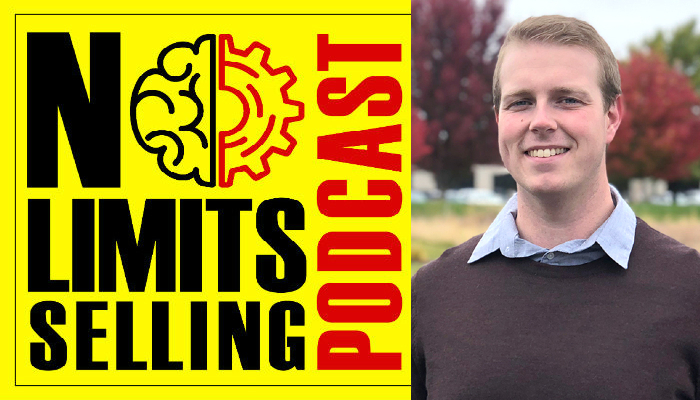Why Successful Training Needs Consistency
On Episode 160 of The No Limits Selling Podcast, we have Sam Johnson, a sales trainer at PayTrace, a SaaS payment gateway focused on making merchants happy. His training expertise empowers sales agents to develop knowledge and use influential tools throughout the B2B marketplace.
Before working with PayTrace, Sam was a sales leader in the NBA and Arena Football League. He serves as an advocate with the Juvenile Diabetes Research Foundation, and volunteers at Partners for Pets in Spokane, Wash.

Contact Sam:
[EDITOR’S NOTE: This podcast is sponsored by No Limits Selling. It is a fun, fast-paced podcast that delivers hard-fought business advice that you can implement today to improve your sales and performance]
Interested In Our Real Estate Coaching Services? Explore Our Website: Link
Feeling Not Well Today? You Can Use Our Mindset Boosters App To amp Up Your Mood: Link
Find us on Social Media:
LinkedIn | Facebook community | Instagram
Like what do you listen to? Subscribe to our podcast!
Ready to become fearless? We can help you become fearless in 60 days so you accomplish more in your career Schedule A 15 min Call with Umar
Summary
Introduction and Background
The podcast begins with the host, Umar Hameed, introducing Sam Johnson, a sales trainer at PayTrace. Sam shares his experiences as a sales trainer and discusses the unique challenges he faces in his role. He emphasizes the importance of understanding the customer's needs and effectively communicating the value of the product or service.
Sales Training at PayTrace
Sam discusses the sales training program at PayTrace. He explains that his role involves not only training the sales team within the company but also influencing their channel partners to sell better. This requires a different approach as these partners do not work directly for PayTrace, but their performance impacts the company's success. Sam highlights the importance of creating value and uncovering the pain points of customers to provide the best possible solutions.
Challenges and Solutions
Sam talks about the challenges of shifting from a transactional to a consultative sales approach. He explains that many salespeople in the credit card processing industry are very transactional, focusing on cost and price. However, Sam trains them to be more consultative, focusing on the value they can provide to the customer and addressing their specific needs and pain points. This involves understanding the customer's current situation and the gap between where they are now and where they need to be.
Feedback and Continuous Improvement
Sam discusses the importance of feedback in improving the sales training process. He uses data to measure the success of the training and maintains a constant dialogue with the salespeople to understand their challenges and needs. This feedback loop allows him to continuously improve the training program and adapt it to the changing needs of the sales team.
Advice for Salespeople
Toward the end of the podcast, Sam shares some advice for salespeople. He emphasizes the importance of being persistent and uncovering the customer's pain points. He also stresses the importance of continuous learning and adapting to the customer's needs. He believes that the best salespeople are those who can identify the best tools and solutions for their customers and help fill their knowledge, efficiency, or cost gaps.
Conclusion
In this podcast, Sam Johnson, a sales trainer at PayTrace, shares his insights on the challenges and strategies of sales training. He emphasizes the importance of shifting from a transactional to a consultative sales approach, focusing on understanding the customer's needs and providing value. He discusses the role of feedback in improving the training process and stresses the need for salespeople to be persistent, continuously learn, and adapt to the customer's needs. The podcast highlights the importance of effective sales training in achieving business success and provides valuable advice for salespeople on how to become more effective in their roles.
Questions & Answers
Who is Sam Johnson and what is his role at PayTrace?
What is the sales training approach at PayTrace?
What are the challenges faced in sales training and how does PayTrace overcome them?
How does PayTrace measure the success of their sales training program?
What advice does Sam Johnson have for salespeople?
Don’t miss this opportunity to transform your real estate career with one-on-one coaching. As an experienced real estate coach, I, Umar Hameed, am dedicated to helping you unlock your full potential and achieve your real estate goals. To learn more about who am I and my clients ↓
If you’re ready to take the next step, book an appointment with me today and begin your journey toward success in the real estate industry.
